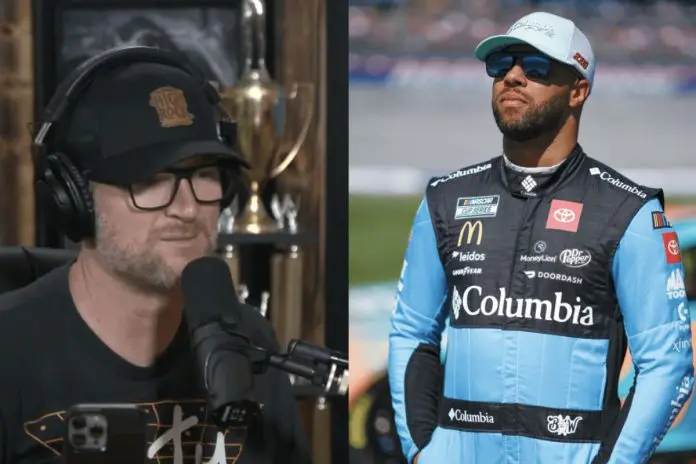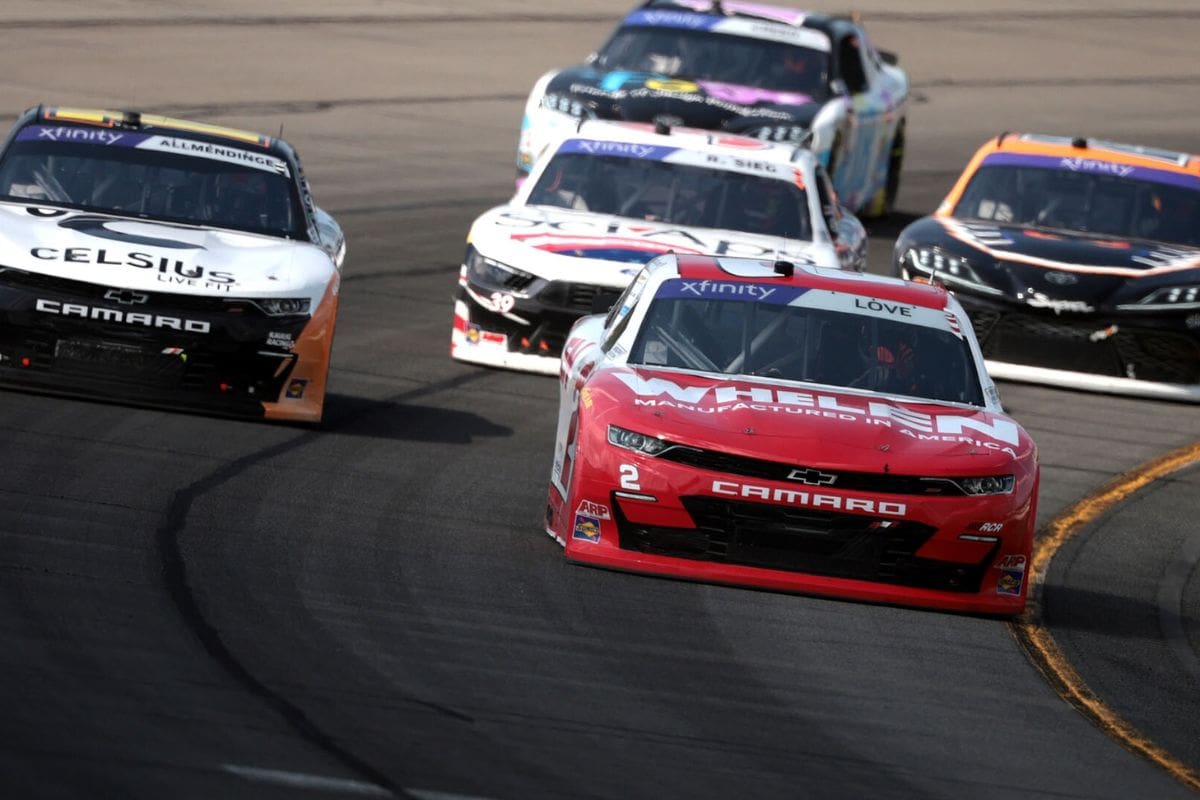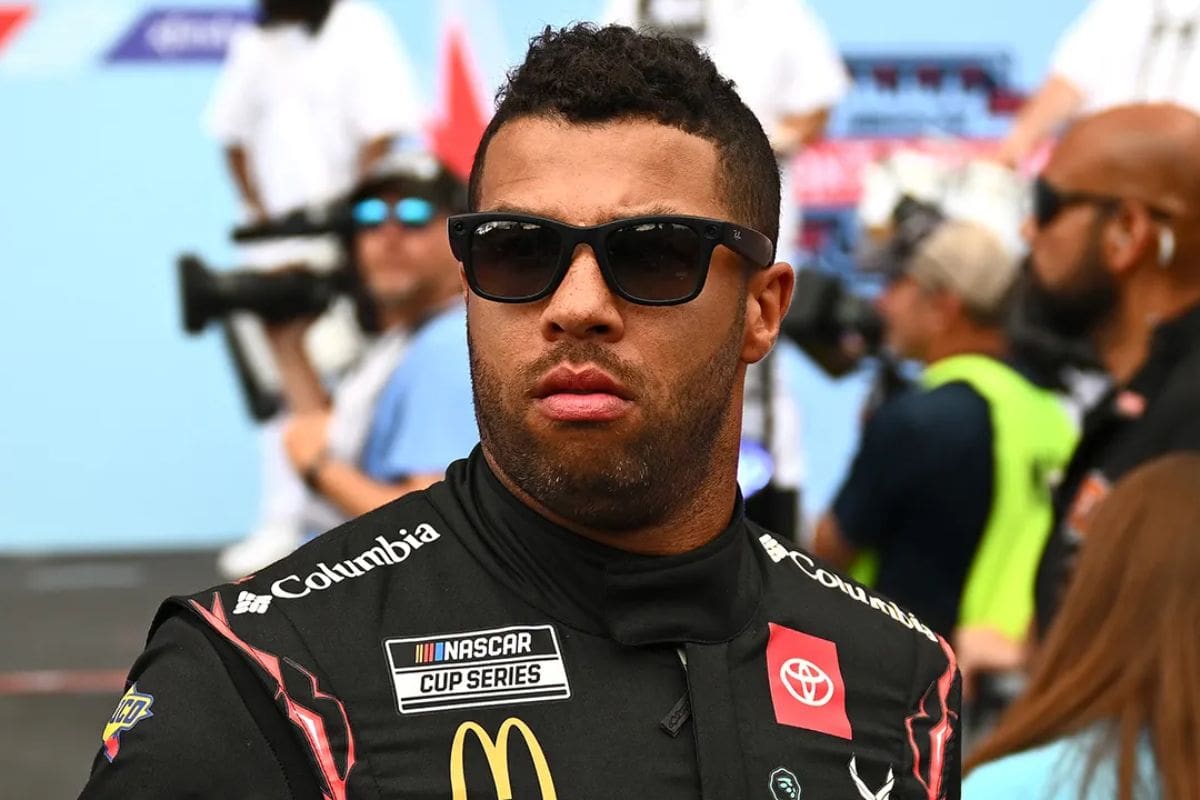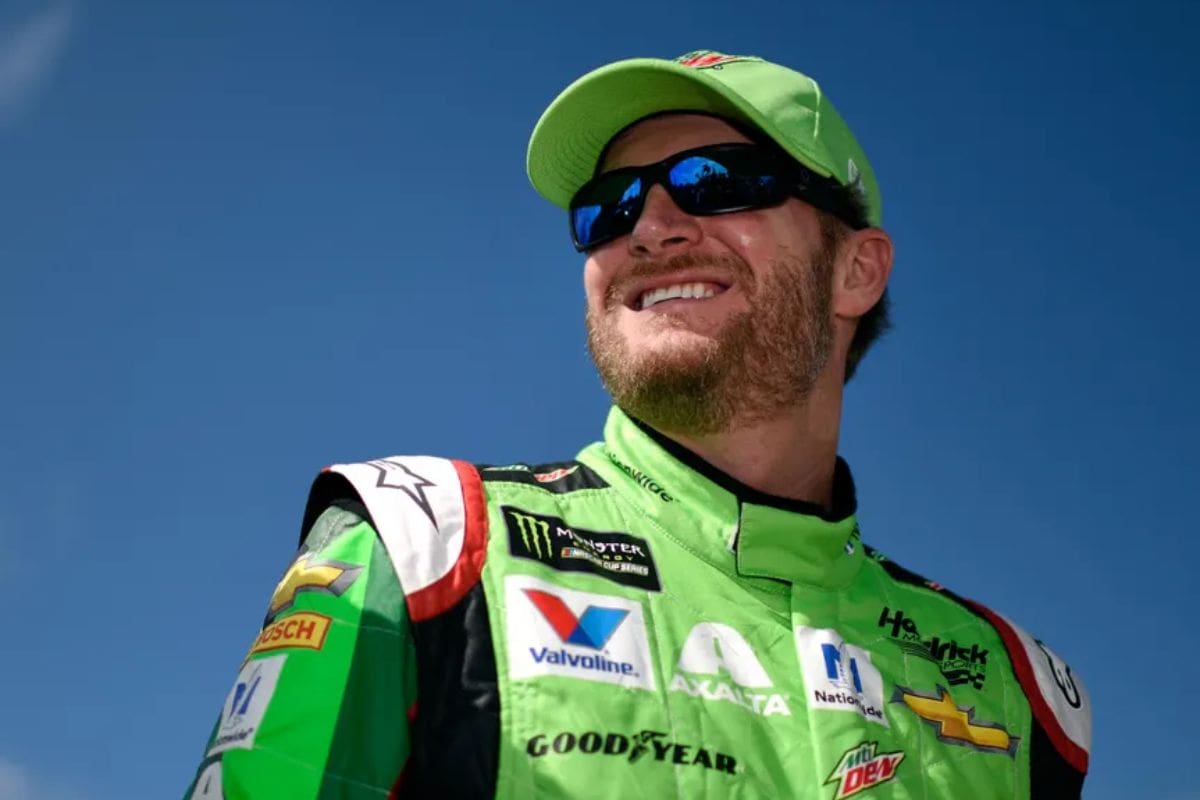Dale Jr. Compares Himself to Bubba Wallace: The recent fine imposed on Bubba Wallace has sparked considerable debate within the NASCAR community, drawing notable commentary from Dale Earnhardt Jr., who has likened Wallace’s situation to his own past experiences. Earnhardt Jr.’s reflections on the complex pressures faced by drivers and the need for a transparent penalty system. By advocating for consistency and fairness, Earnhardt Jr. highlights broader issues within the sport’s regulatory framework. As Wallace navigates this controversy, the racing world is left to ponder the implications for NASCAR’s integrity and the future of its disciplinary practices.
Key Highlights
- Dale Earnhardt Jr. supports Bubba Wallace’s professionalism under pressure from NASCAR’s inconsistent penalty system.
- Earnhardt Jr. highlights the extra pressures Wallace faces as the only black driver in NASCAR.
- Earnhardt Jr. criticizes NASCAR’s inconsistent fines, advocating for a standardized penalty system.
- Both Earnhardt Jr. and Wallace emphasize the need for transparency and fairness in NASCAR’s disciplinary actions.
- Earnhardt Jr. acknowledges Wallace’s emotional resilience and constructive response to the $50,000 fine.
Overview of NASCAR’s Inconsistent Fines
NASCAR’s penalty system has come under examination for its inconsistent application of fines, particularly in view of recent sanctions imposed on drivers like Bubba Wallace. The recent $50,000 fine levied against Wallace following an incident with Alex Bowman at the Chicago Street Race has ignited a broader debate about the uniformity and transparency of NASCAR’s disciplinary measures.
Critics argue that the current system lacks a clear and consistent framework, leading to perceptions of arbitrary and uneven enforcement. Historically, NASCAR’s approach to penalties has been perceived as capricious, with fines and sanctions varying significantly across similar infractions. This inconsistency not only affects the credibility of the governing body but also impacts the drivers’ understanding of acceptable behavior on the track.
For instance, other drivers involved in comparable altercations have received different levels of punishment, raising questions about the criteria used in the decision-making process. The controversy surrounding Wallace’s fine has drawn attention to the need for a more standardized penalty system. Advocates for reform suggest that a codified set of guidelines would magnify fairness and predictability, making it easier for drivers to adhere to the rules and for officials to administer justice impartially.
Dale Earnhardt Jr.’s Support for Bubba Wallace
Dale Earnhardt Jr. has voiced his support for Bubba Wallace, praising his composure and maturity in the face of what Earnhardt considers an excessive penalty. In a recent statement, Earnhardt acknowledged Wallace’s unique position as the only black driver in the NASCAR Cup Series, highlighting the extra pressures and challenges Wallace faces in the sport. Earnhardt’s comments not only showcase his empathy towards Wallace but also his critique of NASCAR’s decision-making process.
“We all probably have mental challenges and battles going on than we’d like to admit. But he’s been open about that…It seems like Bubba definitely does dwell on certain instances like this…and maybe makes it a bit larger in his mind than it is to the rest of us.” – dale jr
Earnhardt lauded Wallace for his ability to maintain professionalism and accept the consequences of the penalty, despite the controversy surrounding its harshness. This recognition from Earnhardt, a respected figure in NASCAR, lends considerable weight to Wallace’s approach and resilience. The endorsement serves as a tribute to Wallace’s character and his ability to navigate adversity with dignity.
“And I can relate to that, my wife and I talk about that a lot. I have that same potential. So if something happens, we get into an argument, and I think the worst-case scenario…And she’s like, Hey, that was just an argument. That’s all that was.”
“When he gets this fine, the media’s going to cover it…and he feels the way to that. He goes home, analyzes himself, and does a lot of reflecting.” – dale jr
Furthermore, Earnhardt’s criticism of the penalty reflects a broader concern within the NASCAR community regarding the consistency and fairness of sanctions. By publicly supporting Wallace, Earnhardt implicitly calls for more transparency and fairness in the enforcement of rules.
Bubba Wallace’s Response to the Fine
Bubba Wallace’s response to the $50,000 penalty reflects his remarkable ability to convert adversity into an opportunity for personal growth and introspection. Rather than expressing frustration or resentment, Wallace viewed the fine as a pivotal moment in his career. He candidly described the penalty as “the best thing that happened to him,” underscoring his proactive approach to the challenges he faces both on and off the track.
Wallace’s statement is a proof of his resilience and maturity. By embracing the fine as a catalyst for self-improvement, he exemplifies a mindset that many athletes and professionals can aspire to. This approach can be broken down into four key elements:
- Self-Reflection: Wallace used the incident as a moment to look inward and assess his actions critically, demonstrating a willingness to learn from his mistakes.
- Growth Mindset: He saw the fine not as a setback, but as an opportunity to grow, highlighting his commitment to continuous improvement.
- Emotional Resilience: By maintaining a positive outlook despite the financial and emotional burden of the fine, Wallace showcased his ability to handle pressure and challenges effectively.
- Public Perception: His constructive response may influence public opinion positively, reinforcing his reputation as a thoughtful and principled competitor.
In NASCAR, where every action is scrutinized, Wallace’s response serves as a powerful example of how to turn a challenging situation into a stepping stone for future success. His perspective not only sets a high standard for personal conduct but also offers valuable insights for anyone facing similar trials in their professional venture.
Comparison with Past Incidents
The penalties for similar incidents highlights a troubling view in NASCAR’s disciplinary actions. The recent fine imposed on Bubba Wallace has reignited discussions about the organization’s approach to enforcement. A striking comparison can be drawn with Chase Elliott’s altercation with Daniel Suarez, which, despite bearing similarities to Wallace’s incident, did not result in any monetary penalty. Such disparities call into question the criteria NASCAR uses to determine the severity of penalties and whether these standards are applied uniformly across the board.
Dale Earnhardt Jr.’s commentary emphasizes this incongruity by pointing out how historical precedents seem to fluctuate, depending on the drivers involved and the context of the incidents. Earnhardt Jr. spotlights the lack of a clear, consistent framework for penalizing drivers. This creates an environment where penalties appear arbitrary, undermining the perception of fairness and impartiality that is critical for maintaining the sport’s integrity.
“I thought 50 grand is excessive. NASCAR has their reasons, I don’t know what they were…But I was surprised by that, that was a large fine.” – dale jr
Moreover, these inconsistencies can affect driver behavior and the competitive landscape as a whole. If drivers perceive the disciplinary process as capricious, it may lead to increased on-track aggression or hesitation, depending on their expectations of potential repercussions. This unpredictability does not only impact drivers but also influences team strategies and fan engagement, as the sport’s credibility hinges on transparent and equitable rule enforcement.
Historical Context and Calls for Consistency
Examining the historical background of NASCAR’s disciplinary actions reveals a longstanding pattern of inconsistent penalties that have prompted calls for a more standardized approach. Historically, NASCAR has faced criticism for the uneven application of fines and suspensions, leading to perceptions of favoritism and unfairness.
Such disparities were notably evident during the 2014 Bank of America 500, where penalties for similar infractions varied widely among drivers. This variation in enforcement emphasizes the need for a more uniform punitive system.
Dale Earnhardt Jr., a prominent voice in the NASCAR community, has highlighted these disparities, advocating for a clear and consistent disciplinary framework. This sentiment is echoed by many within the sport, who recognize the significance of fairness in maintaining the integrity of competition.
- Past Incidents: Drivers have faced different penalties for similar actions, leading to confusion and frustration among competitors and fans alike. This disparity has undermined confidence in NASCAR’s governance.
- High-Profile Cases: High-profile cases, such as those involving Tony Stewart and Kyle Busch, have exemplified the erratic nature of NASCAR’s disciplinary measures. These cases often attract notable media attention, magnifying the perceived inequities.
- Calls for Reform: Influential figures like Dale Earnhardt Jr. have called for reforms, emphasizing the importance of transparency and uniformity in penalty decisions to ensure all drivers are treated equitably.
- Impact on the Sport: The lack of consistency in penalties not only affects the reputation of NASCAR but also impacts the competitive balance within the sport, potentially influencing race outcomes and championship standings.
News in Brief: Dale Jr. Compares Himself to Bubba Wallace
The comparison between Dale Earnhardt Jr. and Bubba Wallace highlights the importance of consistent and transparent penalty enforcement within NASCAR.
Earnhardt’s support for Wallace showcases the ongoing challenges faced by drivers in navigating the sport’s regulatory complexities.
By examining past inconsistencies, the argument for a more fair framework becomes clear.
Implementing a standard penalty system is crucial to upholding NASCAR’s integrity and guaranteeing fair treatment for all competitors.
ALSO READ: Dale Earnhardt Jr. Defends Next Gen Car Amid Short Track Issues




